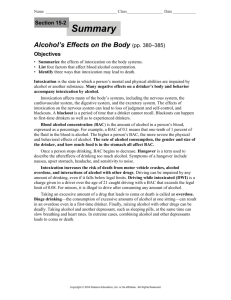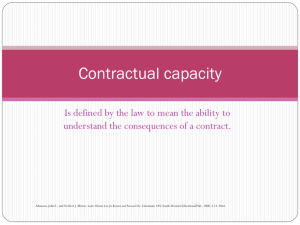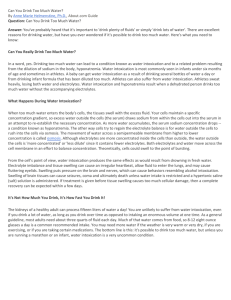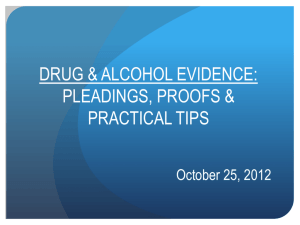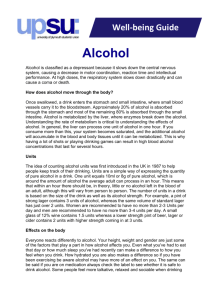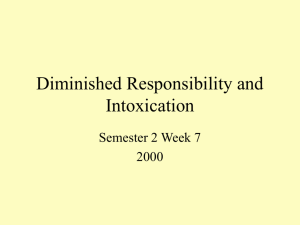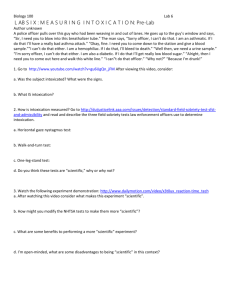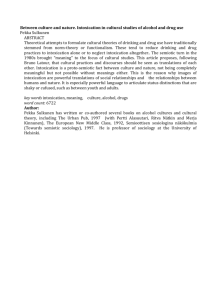Effects of blood alcohol content on thinking, feeling and behavior:
advertisement
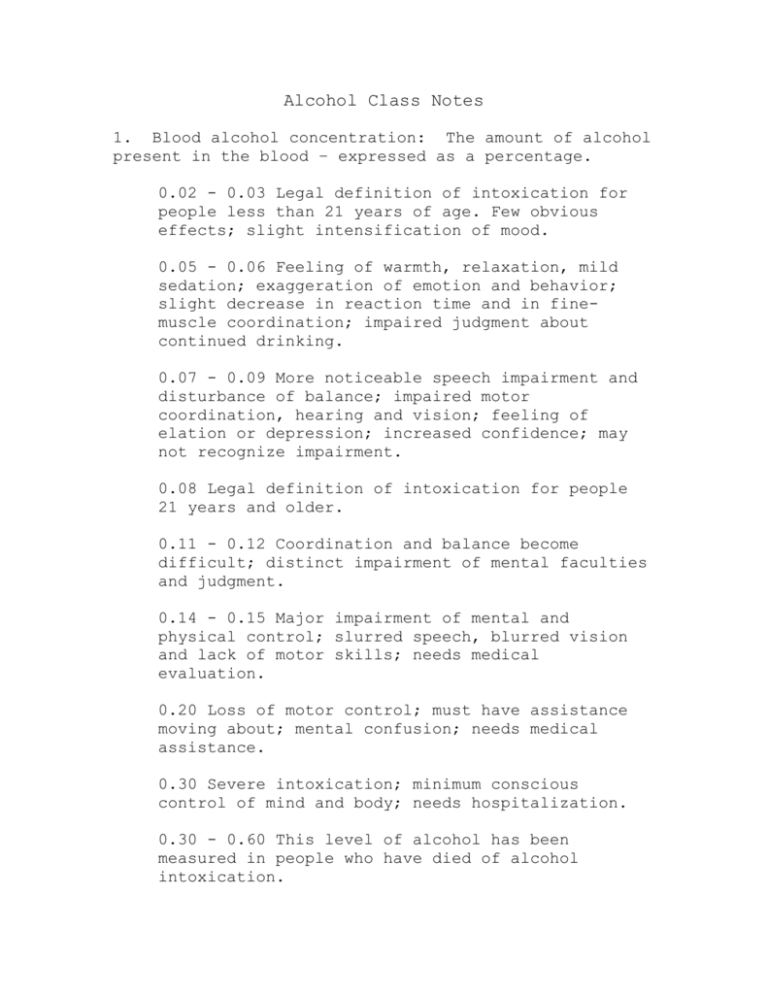
Alcohol Class Notes 1. Blood alcohol concentration: The amount of alcohol present in the blood – expressed as a percentage. 0.02 - 0.03 Legal definition of intoxication for people less than 21 years of age. Few obvious effects; slight intensification of mood. 0.05 - 0.06 Feeling of warmth, relaxation, mild sedation; exaggeration of emotion and behavior; slight decrease in reaction time and in finemuscle coordination; impaired judgment about continued drinking. 0.07 - 0.09 More noticeable speech impairment and disturbance of balance; impaired motor coordination, hearing and vision; feeling of elation or depression; increased confidence; may not recognize impairment. 0.08 Legal definition of intoxication for people 21 years and older. 0.11 - 0.12 Coordination and balance become difficult; distinct impairment of mental faculties and judgment. 0.14 - 0.15 Major impairment of mental and physical control; slurred speech, blurred vision and lack of motor skills; needs medical evaluation. 0.20 Loss of motor control; must have assistance moving about; mental confusion; needs medical assistance. 0.30 Severe intoxication; minimum conscious control of mind and body; needs hospitalization. 0.30 - 0.60 This level of alcohol has been measured in people who have died of alcohol intoxication. 0.40 Unconsciousness; coma; needs hospitalization. 2. Why does alcohol impact men and women differently? There are several physiological reasons that cause a woman to feel the effects of alcohol more than a man, even if they are the same size. There is also increasing evidence that women are more susceptible to alcohol's damaging effects than are men. Below are explanations of why men and women’s bodies process alcohol differently. Ability to dilute alcohol Women have less body water (52% for the average woman v. 61% for the average man) then men which means that a man's body will automatically dilute the alcohol more than a woman's body, even if the two people weigh the same amount. Ability to metabolize alcohol Women have less dehydrogenase, a liver enzyme that breaks down alcohol, than men. So a woman's body will break down alcohol more slowly than a man's. Hormonal factors Premenstrual hormonal changes cause intoxication to set in faster during the days right before a woman gets her period. Birth control pills or other medication with estrogen will slow down the rate at which alcohol is eliminated from the body. Women are more susceptible to long-term alcoholinduced damage. Women who are heavy drinkers are at greater risk of liver disease, damage to the pancreas and high blood pressure than male heavy drinkers. Proportionately more alcoholic women die from cirrhosis than do alcoholic men. 3. What other factors affect your response to alcohol? Food Having food in your stomach can have a powerful influence on the absorption of alcohol. The food will dilute the alcohol and slow the emptying of the stomach into the small intestine, where alcohol is very rapidly absorbed. Peak BAC could be as much as 3 times higher in someone with an empty stomach than in someone who has eaten a meal before drinking. Eating regular meals and having snacks while drinking will keep you from getting too drunk too quickly. 4. What is the difference between a blackout and passing out? Blackouts occur when people have no memory of what happened while intoxicated. These periods may last from a few hours to several days. During a blackout, someone may appear fine to others; however, the next day s/he cannot remember parts of the night and what s/he did. The cause of blackouts is not well understood but may involve the interference of short-term memory storage, deep seizures, or in some cases, psychological depression. Blackouts shouldn't be confused with "passing out," which happens when people lose consciousness from drinking excessive amounts of alcohol. Losing consciousness means that the person has reached a very dangerous level of intoxication; they could slip into a coma and die. If someone has passed out, call EMS immediately. Immediate medical attention is needed. 5. What is a hangover and can I prevent it? Hangovers are the body's reaction to poisoning and withdrawal from alcohol. Hangovers begin 8 to 12 hours after the last drink and symptoms include fatigue, depression, headache, thirst, nausea, and vomiting. The severity of symptoms varies according to the individual and the quantity of alcohol consumed. People have tried many different things to relieve the effects of "the morning after," and there are a lot of myths about what to do to prevent or alleviate a hangover. The only way to prevent a hangover is to drink in moderation: * Eat a good dinner and continue to snack throughout the night. * Alternate one alcoholic drink with one nonalcoholic drink. * Avoid drinking games or shots. Drinking a large amount of alcohol in a short amount of time is the most likely way to become dangerously intoxicated. Here are some of the things that WON'T help a hangover: Drinking a little more alcohol the next day. This simply puts more alcohol in your body and prolongs the effects of the alcohol intoxication. Having caffeine while drinking will not counteract the intoxication of alcohol; you simply get a more alert drunk person. Excessive caffeine will continue to lower your blood sugar and dehydrate you even more than alcohol alone. Giving water to someone who is throwing up. Once the stomach is irritated enough to cause vomiting, it doesn't matter what you put into it -- it's going to come back up. Any liquid will cause a spasm reaction and more vomiting. It's best not to take a pain reliever before going to bed. Give your body a chance to process the alcohol before taking any medication.
